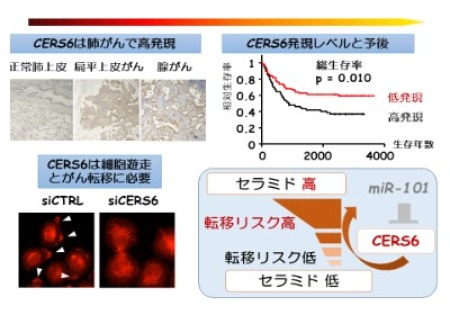
教授 鈴木 元
SUZUKI, Motoshi, Professor
臨床検体と培養細胞双方から肺がんに特徴的な遺伝子発現プロファイルに注目し、肺がん発生と悪性化、転移に関係する遺伝子や経路を単離してきました。また、新しいがん治療法である重粒子治療や、特異的ながん抗原抽出に向けた技術開発も行なっています。
We have focused on gene expression profiles characteristic of lung cancer from both clinical specimens and cultured cells, and have isolated genes and pathways associated with lung cancer development, malignancy, and metastasis. We are also developing technologies for heavy particle therapy, a new cancer treatment method, and for the extraction of specific cancer antigens.
セラミド合成を介する肺がん転移機構の解明を目指す
Aiming to elucidate the mechanism of lung cancer metastasis mediated by ceramide synthesis.
セラミドとがん転移 -Ceramide and cancer metastasis

セラミド合成を介する肺がん転移機構の存在を示してきました。肺がんではCERS6と呼ばれるセラミド合成酵素が活発に活動をしています。その結果合成される代謝産物C16セラミドが、がん転移に必須なラメリポディアと呼ばれる構造体を形成して転移が引き起こされます。現在、この経路を標的とした肺がん治療薬を開発中です。
Sphingolipids contribute to unique biological properties, though their functions in cancer pathogenesis are largely unknown. Our analysis of 149 NSCLC specimens and 16 cell lines showed that under the tumor-suppressor miR-101 control the ceramide synthase gene CERS6 was overexpressed and associated with invasion, and that in lung cancer cells CERS6 promotes metastasis through lamellipodia formation. Targeting CERS6-dependent sphingolipid-metabolic homeostasis may provide a novel therapeutic strategy for NSCLC.
研究テーマ -Research Topics-
- ゲノムインスタビリティーの理解とその応用
- がん代謝の理解とその応用
- がん幹細胞の理解とその応用
- 抗がん剤感受性の理解とその応用
- がん免疫の理解とその応用
- マイクロアレイ、質量分析等網羅的解析手法を用いたがん研究と臨床検査への応用
- 酵素抗原法の病態解明への応用
連絡先 -Contact information-
E-mail: motosuzu<at>fujita-hu.ac.jp
※<at>は@と置き換えて下さい
